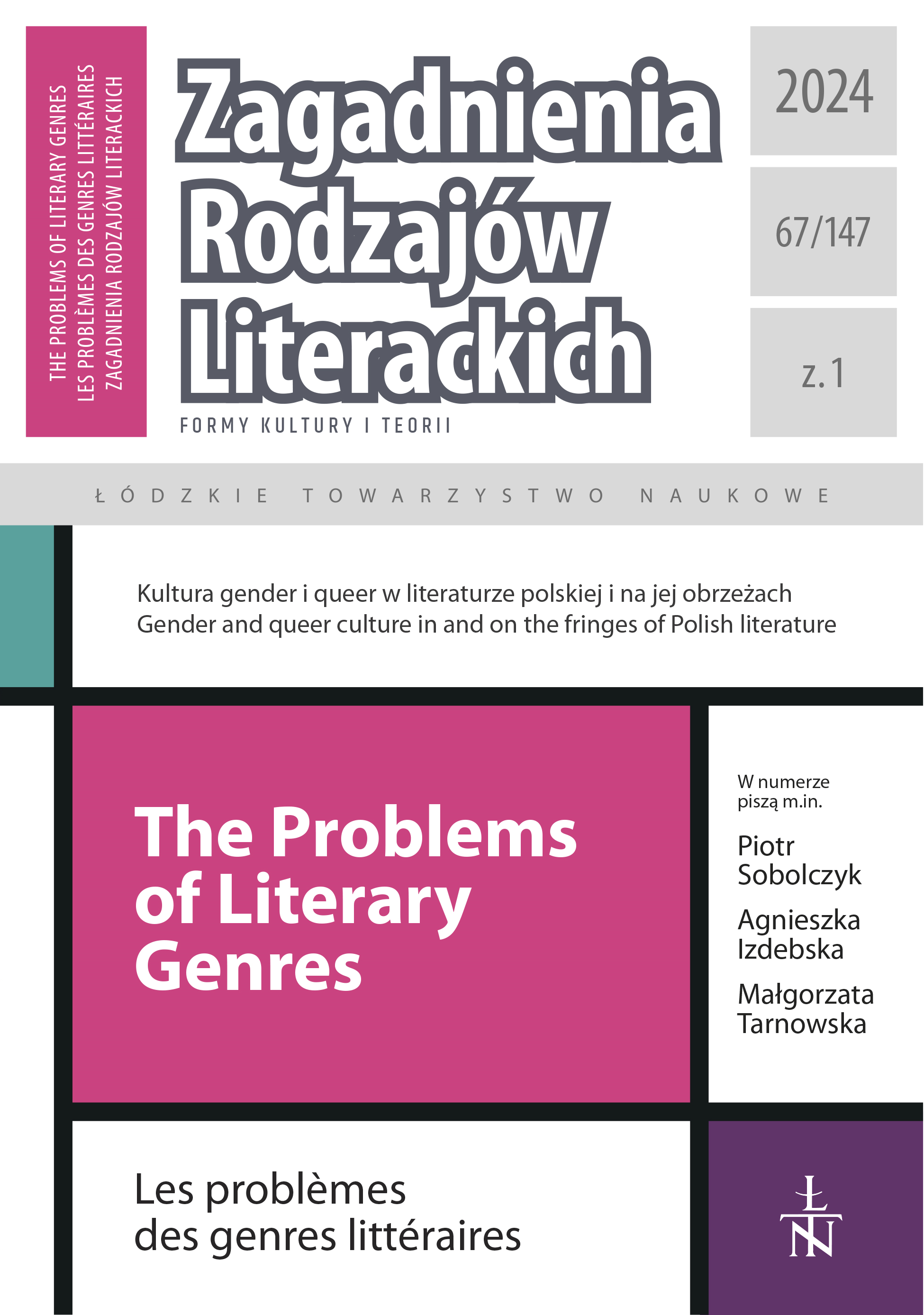Living Outside the Heteronormativity — "Pustostany", "Cukry" and "Czerwony Młoteczek" by Dorota Kotas
DOI:
https://doi.org/10.26485/ZRL/2024/67.1/10Keywords:
heteronormativity; compulsion heterosexuality; non-heteronormativity; contemporary literature and sexual normativity; Dorota KotasAbstract
In this article, I refer to the concept of compulsory heterosexuality, characterized by such queer theorists as Adrienne Rich, Sara Ahmed, and Judith Butler. The norms created and popularised by heterosexual couples have a constant impact on the lives of non-heteronormative people, as shown by the example of heroines and narrators of Dorota Kotas’ works (Pustostany 2019, Cukry 2021, Czerwony młoteczek 2023). The strategies adopted towards forced heterosexuality may be based on assimilation — striving to adopt as much as possible — or anti-assimilation, opposing adjustment. I analyze Dorota Kotas’s novels in chronological order, as they were published, noting that issues related to non-heteronormativity are becoming an increasingly common topic in her works. The matter of non-cisgender identity, raised in her latest novel, seems just as important, since the very disruption of the gender binary makes it impossible to establish any kind of homonormativity — a concept treated by some as a direct response to heteronormativity. In the conclusion, I point out that the behavior of Kotas’ heroines clearly shows that it is impossible to escape heteronormativity — even if you oppose it, you exist in relation to the ruling power. This analysis could contribute to a deeper understanding of the mechanisms governing sexual normativity.
Downloads
References
Adamczewska-Baranowska Izabella (2022), Trans-krypcje. Subwersywna gra z transmemuarem Paula B. Preciady, Susan Faludi i Maggie Nelson, „Autobiografia Literatura Kultura Media” nr 1.
Ahmed Sara (2018), Uczucia odmieńcze, przeł. S. Królak, „Dialog” nr 10(743).
Basiuk Tomasz (2000), „Queerowanie” po polsku, „Furia Pierwsza” nr 7.
Butler Judith (2006), Krytycznie Queer, przeł. A. Rzepa [w:] Teorie literatury XX wieku. Antologia, red. A. Burzyńska, M.P. Markowski, Wydawnictwo Znak, Kraków.
Butler Judith (2008a), Imitacja i nieposłuszeństwo płciowe, przeł. E. Majewska [w:] Antropologia ciała, zagadnienia i wybór, red. M. Szpakowska, Wydawnictwa Uniwersytetu Warszawskiego, Warszawa.
Butler Judith (2008b), Uwikłani w płeć, przeł. K. Krasuska, Krytyka Polityczna, Warszawa.
Duda Maciej (2023), Literatury i psychoterapie: Autyzm i literatura [2: Kotas, Kącka], „Czas Kultury” nr 8, czaskultury.pl/artykul/literatury-i-psychoterapie-autyzm-i-literatura-2-kotaskacka [dostęp: 20.04.2024].
Dunin Kinga (2022), Partnerki to nie to samo co przyjaciółki [o biografii Marii Dulębianki], „Krytyka Polityczna”, 10 września, krytykapolityczna.pl/kultura/czytaj-dalej/kinga-dunin--czyta/kim-byla-maria-dulebianka [dostęp: 10.04.2024].
Gralewicz-Wolny Iwona (2023), „Dziewczyna w spektrum”. O „Cukrach” Doroty Kotas, „Świat i Słowo” nr 41(2).
Jakubiak Magda, Kotas Dorota (2021), Dorota Kotas i jej lesbijska, autobiograficzna powieść, „Replika”, 29 marca, replika-online.pl/chcialam-napisac-cos-lesbijskiego [dostęp: 20.04.2024].
Jo-Bonnet Marie (1997), Związki między kobietami od XVI do XX wieku, przeł. B. Szwarcman-Czarnota, Sic!, Warszawa.
Kaliściak Tomasz (2011), Katastrofy Odmieńców, Wydawnictwo Uniwersytetu Śląskiego, Katowice.
Kosofsky Sedgwick Eve (1994), Tendencies, Routledge, Londyn.
Kotas Dorota (2019), Pustostany, Cyranka, Warszawa.
Kotas Dorota (2021), Cukry, Cyranka, Warszawa.
Kotas Dorota (2023a), Czerwony młoteczek, Cyranka, Warszawa.
Kotas Dorota (2023b), Płeć nie istnieje [w:] V. Woolf, Orlando, przeł. T. Bieroń, Wydawnictwo Literackie, Kraków.
Kulpa Robert, Mizielińska Joanna, Stasińska Agata (2012), (Un)Translatable Queer?, or What is Lost and Can be Found in Translation… [w:] IMPORT — EXPORT — TRANSPORT. Queer Theory, Queer Critique and Activism in Motion, red. S. Mesquita, M.K. Wiedlack,
K. Lasthofer, Zaglossus, Wiedeń.
Mizielińska Joanna (2006), Płeć, ciało, seksualność. Od feminizmu do teorii queer, TAiWPN Universitas, Kraków.
Preciado Paul B. (2019), Mieszkanie na Uranie. Kroniki z przeprawy, przeł. A. Araszkiewicz, Karakter, Kraków.
Rich Adrienne (2016), Przymus heteroseksualności a egzystencja lesbijska, przeł. A. Kamińska [w:] A. Rich, 21 wierszy miłosnych, przeł. J. Głuszak, Biuro Literackie, Stronie Śląskie.
Sikora Agata (2023), Ja w pudełku, „Dwutygodnik” nr 365, www.dwutygodnik.com/artykul/10824-ja-w-pudelku.html [dostęp: 20.04.2024].
Wróbel Olga (2023), O sobie, „Dwutygodnik” nr 360, www.dwutygodnik.com/artykul/10708--o-sobie.html [dostęp: 20.04.2024].
Downloads
Published
How to Cite
Issue
Section
License
Copyright (c) 2024 Łódzkie Towarzystwo Naukowe and authors

This work is licensed under a Creative Commons Attribution 4.0 International License.







